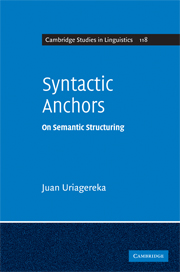Book contents
- Frontmatter
- Contents
- List of tables
- List of figures
- List of acronyms
- Introduction
- Acknowledgements
- 1 In defence of D-structure
- 2 So what's in a word?
- 3 Relational nouns, reference and grammatical relations
- 4 Online conditions and parametric variation
- 5 Prepositional case throughout
- 6 Iteration and related matters
- 7 (Re)Interpreting the Chomsky Hierarchy
- 8 Naturalizing meaning
- Epilogue: Evo-Devo-Perfo
- References
- Index
8 - Naturalizing meaning
Published online by Cambridge University Press: 22 September 2009
- Frontmatter
- Contents
- List of tables
- List of figures
- List of acronyms
- Introduction
- Acknowledgements
- 1 In defence of D-structure
- 2 So what's in a word?
- 3 Relational nouns, reference and grammatical relations
- 4 Online conditions and parametric variation
- 5 Prepositional case throughout
- 6 Iteration and related matters
- 7 (Re)Interpreting the Chomsky Hierarchy
- 8 Naturalizing meaning
- Epilogue: Evo-Devo-Perfo
- References
- Index
Summary
Introduction
In the previous chapter we began to outline how the relation between paradigmatic and syntagmatic structures can be soundly expressed in a minimalist grammar. In this last chapter we ought to further that idea, explicitly stated as desideratum (19) in chapter 7, as part of what can be thought of as the ‘naturalization’ of purely structural aspects of meaning – either because they are directly so (the radical version of the present program) or because they somehow reflect the relevant syntax (the conservative version). Along these lines, and assuming deductive relations as expressed in chapter 7, section 8.2 attempts to anchor semantics on syntactic nuances of the Chomsky Hierarchy (CH) sort. Possible interpretations of the various layers of this hierarchy are explored first (for finite-state relations in section 8.2.1, context-free relations in section 8.2.2, and context-sensitive ones in section 8.2.3). Section 8.3 examines the syntactic tool of ‘reprojection’, by first analysing syntactic limits on the expression of quantificational scope (in section 8.3.1), going next into matters of focalization (in section 8.3.2), which bears on how sub-events in a clause can be organized around binary event quantifiers, and finally section 8.3.3 discusses why binary quantificational relations could not be turned around, with the scope of the quantifier being mapped from a syntactically lower position than its restriction.
Information
- Type
- Chapter
- Information
- Syntactic AnchorsOn Semantic Structuring, pp. 266 - 311Publisher: Cambridge University PressPrint publication year: 2008
